Fingers of two Iranian prisoners amputated over theft
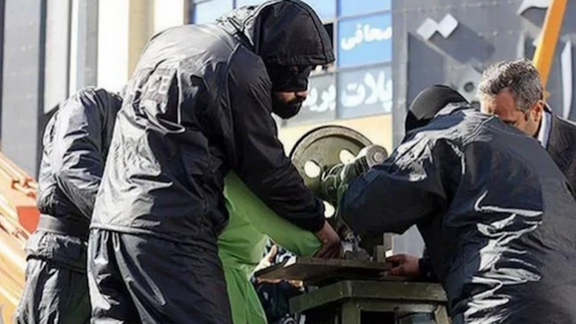
Iran cut off four fingers of the right hands of two brothers convicted of theft on Tuesday as the government continues its onslaught of amputations.

Iran cut off four fingers of the right hands of two brothers convicted of theft on Tuesday as the government continues its onslaught of amputations.
The amputations to Shahab and Mehrdad Teimouri at Urmia Central Prison were carried out using a guillotine-like device after the sentence was approved by the Supreme Court.
The punishment was carried out at the prison's execution unit before the prisoners were transferred to Khomeini Hospital in Urmia for medical treatment.
Shahab, born in 1985, and Mehrdad, in 1990, were originally from Sarpole Zahab in Kermanshah province but resided in Karaj.
They, along with another defendant named Ebrahim Khatibi, were arrested in Karaj in December 2017 for theft. The following year, all three were sentenced to the amputation of four fingers of their right hands by the Juvenile Court of West Azarbaijan province.
The Supreme Court overturned Khatibi's sentence and referred his case to another court, where he was ultimately sentenced to 20 years in prison. Despite appeals from defense attorneys, the amputation sentence for Shahab and Mehrdad was finalized.
Five other prisoners in Urmia Prison face similar amputation sentences. With the transfer of a guillotine to Urmia Central Prison from Tehran, the threat of execution of these sentences has become more imminent, despite international condemnation and human rights concerns.
The issuance and execution of hand amputation sentences became part of the Islamic Republic's judicial system after the 1979 revolution.
The International Covenant on Civil and Political Rights, which Iran has signed, explicitly prohibits cruel and degrading punishment. According to Article 7 of this covenant, “no one shall be subjected to torture or to cruel, inhuman or degrading treatment or punishment.” Amputation is considered such a punishment.
Iran is one of the few countries that uses amputation as punishment for certain crimes and has not joined the International Convention against Torture.
The World Medical Association (WMA) expressed its deep concern about the implementation of such punishments in a letter to Iranian authorities in October 2019. The WMA condemned these punishments as being contrary to human dignity and emphasized that the disability caused by amputation is irreversible and destructive of human dignity.

Israeli air strikes over the weekend knocked out Iran's last three Russian-provided S-300 air defense missile systems and has left the country "naked", Fox News reported citing US and Israeli officials.
The surface-to-air S-300s were the last in the Islamic Republic's arsenal after one was destroyed in an attack in April also likely carried out by Israel, Fox News quoted a senior US official as saying. The strikes were launched from US-provided F-35 jets, the official added.
In an internal phone call, President Biden's adviser for the Middle East Amos Hochstein said "Iran is essentially naked", according to the US news channel.
Israel carried out the air strikes in the early hours of Saturday in retaliation for a ballistic missile barrage from Iran on Oct. 1. One Iranian civilian and four military personnel were killed, Iranian media said, and officials have pledged a response.
“The majority of Iran’s air defense was taken out," an Israeli official told Fox News. The outlet cited US and Israeli officials saying multiple Iranian radar systems were also taken out, depriving the Islamic Republic of the capabilities to launch missiles at Israel in future.
The cycle of attacks this year mark the first direct confrontation between the Islamic Republic and Israel in the arch-foes' nearly 50-year history, and US officials have counseled Iran not to respond.
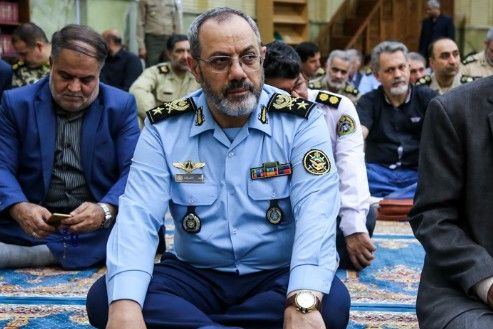
Iran’s Defense Minister has denied reports of Israeli fighter jets entering Iranian airspace during last weekend’s raids as it plays down the damage inflicted after the four-hour assault.
Speaking to Tasnim News Agency, Amir Aziz Nasirzadeh said: "The enemy attempted to damage both our defensive and offensive systems. However, due to precautions, there was minimal impact, and as you saw, there were no casualties or injuries in our defense industries.”
His comments come after the hours-long assault spread over three waves which targeted air defense systems, key Iranian industrial production facilities of missiles and drones, and missile launch bases.
Spread across Tehran, Kermanshah, Qom, Ahvaz, Shiraz, and the farther Semnan province, the operation involved around 100 aircraft.
However, playing down the impact, Nasirzadeh said: “Furthermore, since this technology is domestically produced, we were able to replace one of the air defense systems the very next day, so there has been no disruption in our offensive production capabilities, such as missiles." However, Israeli and other reports say Iran's Russian-made S-300 system was targeted, which is the main long-range interceptor missiles defending the country.
The Defense Minister also went on to dismiss claims that Israeli fighter jets had entered Iranian airspace. "According to the United Nations Charter, any country has the right to respond if its airspace is violated,” he said, suggesting that denials may avoid a necessary deepening of the conflict between the decades-long enemies.
He also denied damage to an IRGC missile facility in Shahroud while satellite imagery from Planet Labs showing a significant impact at the site that builds ballistic missiles and launches rockets as part of its own space program.
So far, Iran only has identified Israeli attacks as taking place in Ilam, Khuzestan and Tehran provinces — not in rural Semnan province where the base is located.
A strike on Shahroud potentially further restrains the IRGC’s ability to manufacture the solid-fuel ballistic missiles it needs to stockpile as a deterrent against Israel. Tehran long has relied on that arsenal as it cannot purchase the advanced Western weapons that Israel and Iran's Persian Gulf Arab neighbors have armed themselves with over the years, particularly from the United States.
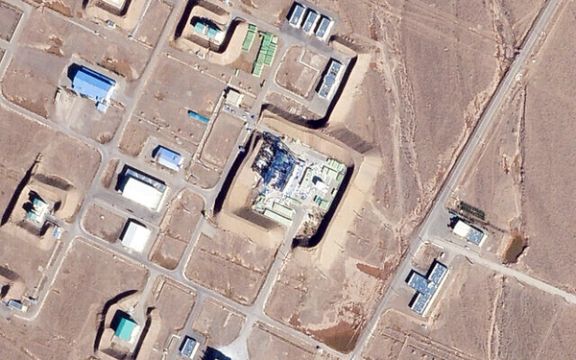
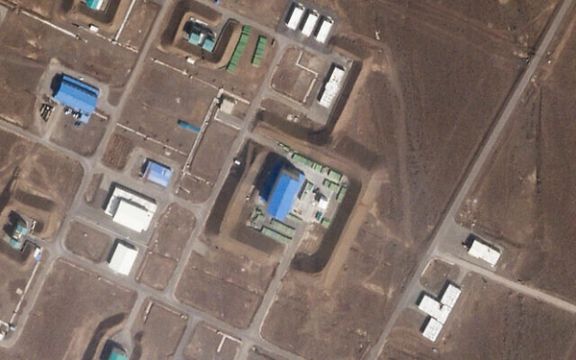
The site also hosts the Imam Khomeini Space Center, which is used by Iran’s space program. The images show a central, major building at the Shahroud Space Center have been destroyed, the shadow of its still-standing frame seen in the image taken Tuesday morning.
The imagery, seen by the Associated Press, showed vehicles gathered around the site, believed to be officials inspecting the damage, with more cars than normal parked at the site’s main gate nearby.
Three small buildings just to the south of the main structure also appeared to be damage, AP said. Iran has been constructing new buildings at the base in recent months. Another hangar to the northeast of the main building also appeared to have been damaged.
On Wednesday, Foreign Minister Abbas Araghchi, speaking to reporters on the sidelines of a cabinet meeting, blamed the US for helping facilitate the logistics of the attack.
”Our intelligence indicates that Israeli fighter jets carried out this attack through a corridor facilitated by US forces," he said. "We have lodged our complaint with the United Nations and other international bodies and will continue to pursue this matter.”
Coordinating Deputy of Iran's Army Admiral Habibollah Sayyari also denied the penetration of Iran’s air space, reported first by Iran International.
“Thanks to the readiness and alertness of our air defenses and Air Force in a coordinated operation, the enemy was prevented from breaching our borders,” he said.
“They were forced to launch ballistic missiles from 100 kilometers outside our borders, many of which were intercepted by our defenses, though some did strike certain areas.”
One day after Iran International reported Israeli F-35s had entered Iran's airspace for the first time and bombed targets near Tehran, CNN reported that Israeli fighter jets entered Iranian airspace during the Saturday attack.
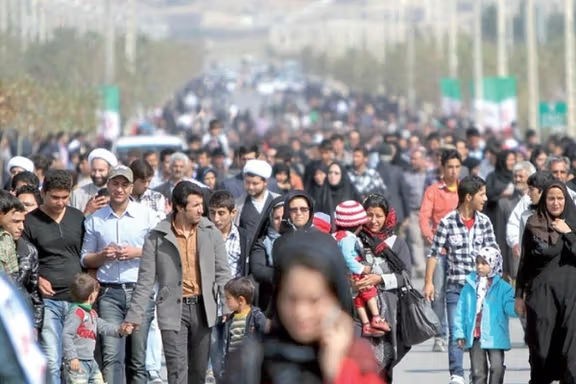
Israel’s air strikes revived the specter of war long gone - a ghastly déjà vu for Iranians who weathered the nigh decade-old struggle with Iraq and a grim induction into its sights and sounds for those too young to remember.
This was the first major attack on Iran in nearly four decades. Israel's previous actions have been assassinations or sabotage.
Before last week, many Iranians were confident that there would be no war, that those ruling Iran are too wary of their survival to lead the country to a full-on conflict. That sense of hopeful security is now gone.
It was around 2am. The sounds of missiles and anti-aircraft gunfire awoke the capital. I rushed to my mobile phone. Most did, I suspect. In moments like this, you just know that nothing worthwhile is to be found on state outlets.
Social media is all that there is, even if rife with speculation and lies. The lack of reliable sources compounds the sense of crisis.
Rozita, a 42-year-old woman living in western Tehran, recalls: “I woke up from the terrifying sounds of explosions and the howl of missiles. My husband and our two young ones were asleep. I gently shook my husband. ‘Get up, Israel’s attacking,’ I said. We turned on the TV - nothing! He said you’ve imagined it. Just then my sister called. ‘Who watches TV?’ she said when I said nothing was on the news, ‘it’s all on Telegram.’”
Iran’s state broadcaster is a parallel universe visualized. Stones and rocks could be raining on Tehran and the TV would have a turbaned man offering relationship advice. Officials do not bother to inform the public.
Everyone’s left to their own devices.
“We talk a lot about war in my family," said Sepehr, a 35-year-old who works in an advertising firm.
“My father naively believes that even if there is war, it’ll just be military targets, and civilians will continue with their lives in peace. But the current situation—not a war but the specter of war—has already hit our business. I may or may not be killed if there’s war, but I’ll sure as hell lose my job.”
Iran’s currency fell rapidly in anticipation of an Israeli attack. It regained some of its loss when it actually happened - a sign, perhaps, that the markets were expecting worse. And then there was the gas station ritual. That’s what we do in these parts: rush to the nearest pump at the first hint of a crisis.
“Youngsters always joke about the run on pumps. But I do it all the time.” said Babak, 52, a factory worker living a hard life.
“War is not just a missile hitting your roof and taking you to the other world. That would be bliss. War is famine, chaos, displacement. A full tank helps you a bit further if you need to. You stock up everything at times of crisis. Why not gas?”
Very few believe a full-scale war is that close. But hearing explosions and seeing fiery projectiles has turned the abstraction to reality, however remote at the moment. And of course there’s the casualties - five, according to the official tally, four soldiers and one civilian nightwatchman.
Up until last week, many argued for an Israeli attack, reassuring others that civilians wouldn’t be harmed since Israel had promised to target only military personnel. The day after the attack, you could tell that that hopeful belief was being revisited.
Tahereh, a 24-year old student living in a dormitory in Tehran, thinks the distinction between civilian and military is not as clear as many suggest. “My brother is a conscript, a ‘zero-rank’ soldier. He failed to get into university and had to do his (mandatory) service."
"He cooks and sweeps and washes in a base. So is he a legitimate target? Would those who say Israel hits the Islamic Republic only be OK if my brother died?”
It’s a fair question. And people don’t agree on the answer, as far as I can tell. What most Iranians may agree on is that things look as if they will get worse before getting better.
War looms and prices rise. Officials in Tehran bluster and brag. In Tel Aviv, they warn that there’s more to come - that Iran’s skies are open with defense systems destroyed.
“Some say an Israeli attack hastens the demise of the Islamic Republic and welcome it if civilians are not targeted,” Tahereh adds, visibly worried about his brother who has to serve for another year at least. “They say there’s light at the end of the tunnel. I hope they’re right. I just fear that the light might be that of an oncoming train.”

The European Union announced it is considering targeted and significant measures against Iran following the execution of Jamshid Sharmahd, a German citizen and US resident, who was hanged this week.
In a statement on Tuesday, the EU condemned in the strongest terms the execution of the German-Iranian national and expressed its full solidarity with Germany. Similar remarks were made by European Union Foreign Policy Chief Josep Borrell on his X account on Tuesday.
“The European Union reiterates its call on Iran to end the distressing practice of detaining foreign civilians and dual nationals with a view to making political gains,” read the statement by the EU.
Iran executed the 68-year-old dissident who was a software developer and California resident on Monday. He was abducted by Iranian agents during a visit to the United Arab Emirates in 2020 and forcibly taken to Iran. In February 2023, the Iranian judiciary sentenced him to death on charges of endangering national security.
On Tuesday, Germany recalled its ambassador to Iran and summoned the Iranian chargé d'affaires. Several German officials, including German Foreign Minister Annalena Baerbock and Chancellor Olaf Scholz, spoke out against the killing, a move that prompted Iran to react and defend the execution.
The ambassador left Iran on Wednesday morning, said a German foreign ministry spokesperson.
The spokesperson added that the execution of Sharmahd has put "extreme" strain on the relationship between Berlin and Tehran.
The Islamic Republic’s foreign ministry summoned German Ambassador Markus Potzel over what the ministry called Berlin’s meddling in Iran’s internal affairs.

Foreign Minister Abbas Araghchi responded to the announcement on X, saying, “How about 'an EU measure' to end the killing of more than 50k Palestinians in Gaza? How about 'an EU measure' to allow 1.5 million refugees in Lebanon to return to their homes? How about 'an EU measure' to support the families of those killed by Jamshid Sharmahd?”
“If not, Europe only stands for hypocrisy,” the foreign minister added.
Sharmahd was convicted of heading a pro-monarchist group named Tondar accused of a deadly bombing incident that occurred in 2008 at a religious center in Shiraz, killing 14 and injuring 215 more. The accusation, repeatedly denied by Sharmahd, was never substantiated by documented evidence. He was denied a fair trial and due process, as most other political prisoners, especially dual nationals.
“Iranian restrictions on consular access to our citizens, the denial of consular protection and fair trial are not acceptable and stand in direct violation of international law,” the EU noted in its statement.
The EU also slammed the high number of executions in Iran. "The European Union reaffirms its strong and unequivocal opposition to the use of death penalty at all times, in all places and in all circumstances, especially taking into account the alarming increase in executions recorded in Iran last year and this year."
Iran conducted the most executions of any country in the world after China last year, Amnesty said in a report in May, adding that nearly 75% of all executions worldwide in 2023 outside China were in Iran. The recent wave of executions brings the total number of hangings in Iran this year to more than 567, including 20 women, according to rights groups.
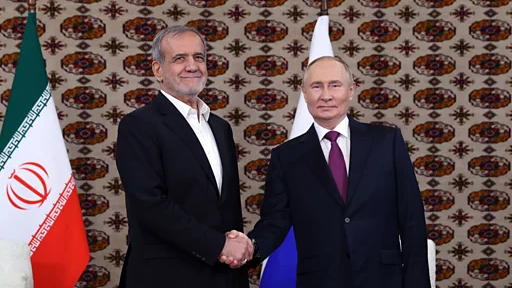
Iran’s government-controlled media have criticized Moscow—frequently hailed by officials as Iran’s 'strategic ally'—for not issuing an immediate and unequivocal condemnation of Israel’s October 26 air strikes on Iran.
Relying on an actor like Russia cannot advance the Islamic Republic’s national interests or ensure its national security, stated a commentary in the reformist Shargh Daily on Monday.
“Although Cairo and Beijing half-heartedly condemned Israel's attack yesterday, there is still no news of Moscow's condemnation,” the newspaper remarked.
The commentary titled “The Russian U-Turn” also criticized Moscow for its support for the UAE’s claim over three Persian Gulf Islands of the Greater and Smaller Tunb and Abu Musa, taking Azerbaijan’s side over the Zangezur Corridor that will block Iran's direct access to Armenia, and years of delay in delivering S-300 air defense missile system to Iran as evidence of Moscow’s failure as an “strategic ally”.
For years, the Islamic Republic led by Ali Khamenei, has touted its doctrine of relying on Russia and China to limit the power and influence of the United States.
Many regional and Islamic countries including Turkey, Saudi Arabia, Qatar, Jordan, and the United Arab Emirates condemned the attack within hours in “strongest terms”, but the Russian Foreign Ministry Spokeswoman Maria Zakharova’s statement Saturday only expressed “deep concern regarding the ongoing explosive escalation” and fell short of condemning the strikes.
“We urge all the stakeholders to exercise restraint, stop violence, and prevent the situation from sliding towards a grave disaster. It is high time that efforts to provoke Iran to respond cease,” Zakharova said.
“Russia’s position on this matter was only slightly different from that of European countries. While asking for restraint, they said Israel had a right to this attack … The difference between these countries and Russia is that they currently have strained relations with Iran due to the accusations they raise about Tehran's involvement in the Ukraine war, and Russia presents itself as Iran's strategic partner,” the moderate-conservative Fararu news website wrote Sunday about Zakharova’s statement.
Israel's three-hour long series of air strikes in the early hours of Saturday targeted Iran's Russian-supplied air defense system and a several military and weapons sites. The operation took place with impunity as Iran's air defenses seemed to have failed to exact any toll on dozens of Israeli warplanes, some of which are said to have reached the capital Tehran.
At the UN Security Council’s emergency meeting Monday, Russia's ambassador, Vasily Nebenzya, praised Iran for showing “unprecedented restraint” and said the Israeli raid had not only violated international law but also would destabilize the already highly tense situation in West Asia.
Nebenzya also alleged that the Israeli strikes had been “coordinated with the US” and urged Israel to “refrain from the practice of provocative military actions in the Middle East but avoided the term “condemn” which bears diplomatic significance.
“As key members of BRICS of which Iran is also a member, Russia and China were expected to officially condemn the attack on our country given the propaganda about Tehran’s strategic relations with Moscow and Beijing,” an article entitled “Where Are Russia and China?” in another reformist newspaper, Ham-Mihan, wrote Tuesday.
Like Moscow's tepid response, Beijing also took three days to officially react to the strikes in a cautious tone.
“The Russians could have taken a stronger position … In matters one side of which Iran and the other side is another Middle Eastern country, whether Arab countries or the Israeli regime, Russians always tend to side with the other country,” Mahmoud Shouri, a Russia expert, told Ham-Mihan website in Tehran.
“Maybe their perception is that their relations with Iran will not be damaged whatever happens but their relations with the other side can be affected,” he added.